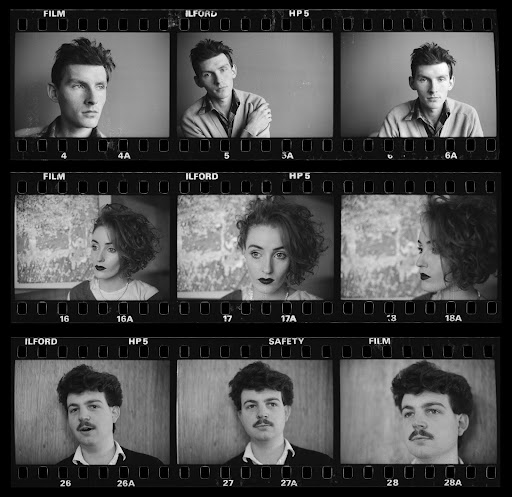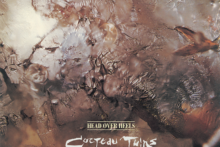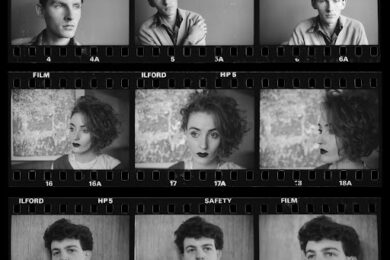On 17 October, Brendan, Lisa, and I went to 4AD’s offices in Alma Road, Wandsworth – coincidentally adjacent to the location of my father’s first childhood home in Melody Road – and formally signed the recording contract with Ivo [Watts-Russell, 4AD co-founder]. It was also confirmed that we were to embark on an eight-date tour of Holland supporting fellow 4AD artists the Cocteau Twins starting in two weeks’ time. My old Mischief mucker Peter Hicks had filled in on bass for a couple of rehearsals after Paul’s departure, but we now needed to seriously prepare ourselves for our first tour including the rapid initiation of the new bassist 4AD had found for us – actually via a recommendation of Cocteau guitarist Robin Guthrie – a seventeen-year-old Scottish lad called Scott Rodger.
Cocteau Twins were now the duo of Liz Fraser and Robin Guthrie, original bassist Will Heggie having recently departed. They were a well-established act and had their own general manager/roadie/driver – Colin Wallace, a friend of Robin and Liz since school days in Grangemouth (Scotland), and whose favourite word was ‘brelliant’ – and tour manager/sound engineer – Ray Conroy, who we’d already encountered on the mixing desk at the Xmal Deutschland gigs and whose brother, Mick, was bassist in another 4AD band, Modern English. We, on the other hand, were just us band members. Brendan didn’t want a manager, so we’d agreed to have a crack at handling the management between us. As I was the only one with any formal administrative experience, I was nominated DCD tour manager, and we informed 4AD accordingly. My first task, then, was to organise the Carnet . . . The what?
This was pre-European Single Market days and it was explained to me that, to tour overseas, you had to temporarily ‘export’ all your equipment from your starting country, temporarily ‘import’ it into and ‘export’ it out of each country you pass through, and finally ‘reimport’ it into the country you started from. The Carnet is the controlling document and has to list everything in detail. You can’t just say two guitars, a bass, three amps and a drum kit – you have to list every individual drum, stand, pedal, effects machine, guitar, strap, amp, tool kit, plug box, and so on, and in every case give the serial number (where applicable), country of origin, value, and weight. A financial bond has to be lodged with your local Chamber of Commerce and, if you fail to account for every item of your equipment at every border (where you must stop and get your Carnet stamped), you can be charged duty as if you’ve sold, acquired, or changed anything which doesn’t tally with the Carnet. What had I got myself into?
So, in the couple of weeks before we left for Holland, we had to sort out transport arrangements and this Carnet, in addition to inducting Scott into the DCD setup and rehearsing for the tour. Jim Pinker joined our tour party as sound engineer, and Brendan’s dad Mike was enlisted to drive us and all our equipment in the Perry family’s old VW camper van.
By the time we were due to leave, I’d just managed to organise all the documentation in the nick of time, had been over to 4AD’s offices to collect our cash float (money to eat and buy fuel until we started to pick up performance fees), and had organised myself a last minute British Visitor’s Passport as I’d never owned a full passport and suddenly realised I’d need one to travel. I was knackered before we started. On 29 October 1983, we rolled off the Isle of Dogs with six of us wedged into the bright orange camper van along with amps, guitars, drum kit, etc. I really should’ve been wondering what on earth I was doing, but I was on a high. Here I was going on tour to a foreign country with a band – amazing!
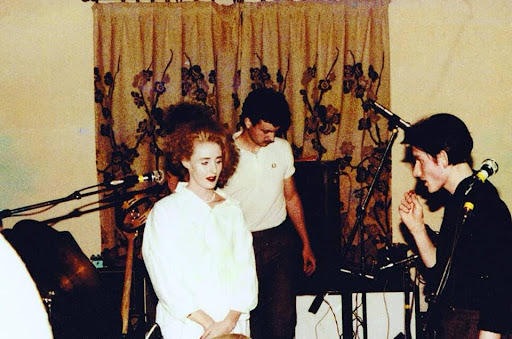
On arrival in Amsterdam the glamourometer took another plunge as we found our hotel was in the same building as a particularly seedy-looking ‘massage parlour’ (complete with gaudy red neon sign which lit up all the rooms at the front) and we could see fleas jumping about in the beds. I was worried Lisa would be freaked out, but she seemed the least concerned of any of us. I think she was so glad to be out of East London for a while, and that we were finally engaged in the activity she’d left home and crossed the globe to pursue, that she’d have accepted anything. I came to realise that she typically responded with admirable stoicism to situations like this – a very valuable asset.
Despite the hotel, we were in Amsterdam – and Amsterdam is beautiful. Once we’d lugged all our equipment into our hotel rooms (it wasn’t safe to leave anything in the Perrymobile overnight), I spent several hours wandering the streets by the canals and soaking up the atmosphere. Exhaustion served me well and, despite the dampness and mustiness of the hotel and its resident wildlife, I slept soundly. The following day we received our venue passes and tour schedule from Dutch promotors Mojo Productions.
For just the opening show at the Paradiso in Amsterdam there was another band on the bill between us and the Cocteaus – The Europeans, whose singer and keyboard player Steve Hogarth would go on to replace Fish as lead singer in Marillion some years down the line. As first band on stage, we were last to soundcheck and were given little time, so as soon as our moment came, we rushed our gear onto the stage and a frenzy of activity ensued. Crisis! None of us had realised that continental Europe uses a different style of electric plug. All our electronic equipment was fitted with UK three-pin plugs, and all available sockets were European two-pin. The promoters arranged a ‘gofer’ to dash out to the nearest hardware store and buy a batch of plugs, and they all had to be changed. Fortunately, this was achieved with only slight disruption to our soundcheck, and we were ready.
We were soon back on stage. The venue wasn’t yet full, but it was getting there, and our opening number was well received. I was settling in, trying not to be distracted by watching our performance, which was being filmed and projected onto screens at the back of the hall. We were about halfway through the third or fourth number – probably something like ‘East of Eden’, in which Brendan was in full flight, singing and pounding into his guitar – when there was a startling bang. Brendan was physically lifted off his feet by several inches and there was a vivid blue flash around him like a fleeting aura. He then started to shake violently. Scott and I shot each other alarmed glances, unsure in that split second whether we should carry on playing (but I’d now been hardwired never to stop). Lisa reacted instantly and rushed to help Brendan.
Fortunately the onstage sound engineer immediately realised that Brendan’s guitar had gone live and he now had full mains voltage earthing through his body into the floor. He ran onstage, screamed at Lisa to get back, and aimed an incredibly well-judged kung fu–style kick at Brendan’s guitar that not only prised it from his grasp, but lifted it high enough that the strap flew over Brendan’s head allowing him to throw down the guitar, breaking the circuit. Brendan staggered to the side of the stage, the power was shut down and we rushed to his aid. The audience, who initially thought they were witnessing some groovy new stage pyrotechnics, now also realised there was a problem, and a concerned hush descended.
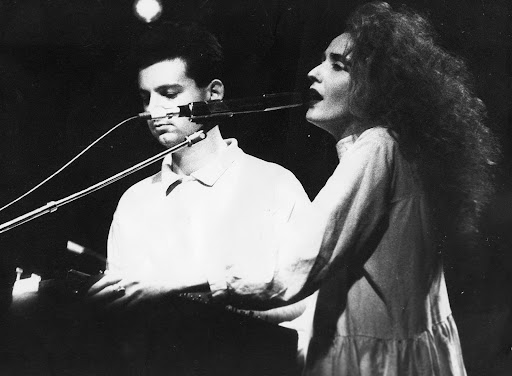
Thankfully Brendan, though somewhat dazed, was otherwise unharmed, but he was in no state to continue. While we packed up our gear, safety checks by the crew revealed that in the rush to get all the replacement plugs fitted, the plug to Brendan’s guitar amp had been live-neutral wired in reverse. Then Mike blurted out that it was he who had rewired the plug and became traumatised by the realisation that he’d come perilously close to being the cause of his own son’s demise. All because of a stupid oversight over the different plug types.
After this unpromising start, things improved rapidly. It was a lowkey tour for the Cocteaus, and beyond Amsterdam they’d been booked into relatively small venues by their standards – clubs with capacities of around three hundred to four hundred. The result was they were all packed to bursting point, and people arrived early to stake their positions, so we got to play to pretty much capacity audiences everywhere. Furthermore, the audience responses were amazing. We got great receptions, lots of encores, and people crowding round to congratulate us after the shows.
At some point around this time– I’m not sure if it was directly related to any damage Brendan’s guitar had sustained from the Paradiso incident – Robin Guthrie took pity on him having to perform with the cheap Tokai ‘Les Paul’-copy that was all Brendan could afford, and gave him his Kawai (with Di Marzio pick-ups to boot). Taken aback, but hugely grateful, Brendan used the Kawai as his main guitar for several years, but only found out much later it was the very guitar Robin had used to record the Cocteau’s wonderful Garlands album – Brendan was gobsmacked!
Drumming with Dead Can Dance: and Parallel Adventures by Peter Ulrich is published by Red Hen Press

